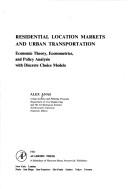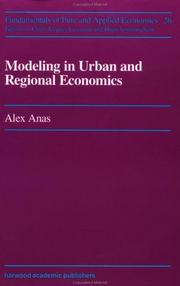| Listing 1 - 10 of 23 | << page >> |
Sort by
|

ISBN: 0120579200 9780120579204 Year: 1982 Publisher: New York Academic Press
Abstract | Keywords | Export | Availability | Bookmark
 Loading...
Loading...Choose an application
- Reference Manager
- EndNote
- RefWorks (Direct export to RefWorks)
Transport. Traffic --- Chicago --- Rental housing --- Transportation --- Location --- Economic aspects --- Planning --- -Transportation --- -338.47 --- Housing --- Real estate business --- Rent --- Public transportation --- Transport --- Transportation, Primitive --- Transportation companies --- Transportation industry --- Locomotion --- Commerce --- Communication and traffic --- Storage and moving trade --- -Economic aspects --- -Planning --- Economie van het verkeer. Economische aspecten van communicatiemedia. Transportbeleid --- 338.47 Economie van het verkeer. Economische aspecten van communicatiemedia. Transportbeleid --- 338.47 --- Rental housing - Location - Economic aspects - Illinois - Chicago Metropolitan Area --- Transportation - Illinois - Chicago Metropolitan Area - Planning --- Chicago [Illinois]

ISSN: 01911708 ISBN: 3718604671 9783718604678 Year: 1987 Volume: 26 Publisher: Chur : Harwood,
Abstract | Keywords | Export | Availability | Bookmark
 Loading...
Loading...Choose an application
- Reference Manager
- EndNote
- RefWorks (Direct export to RefWorks)
Abstract | Keywords | Export | Availability | Bookmark
 Loading...
Loading...Choose an application
- Reference Manager
- EndNote
- RefWorks (Direct export to RefWorks)
Book
Abstract | Keywords | Export | Availability | Bookmark
 Loading...
Loading...Choose an application
- Reference Manager
- EndNote
- RefWorks (Direct export to RefWorks)
Book
Year: 2009 Publisher: Washington, D.C., The World Bank,
Abstract | Keywords | Export | Availability | Bookmark
 Loading...
Loading...Choose an application
- Reference Manager
- EndNote
- RefWorks (Direct export to RefWorks)
This study examines impacts on net social benefits or economic welfare of alternative policy instruments for reducing traffic congestion and atmospheric emissions in Sao Paulo, Brazil. The study shows that expanding road networks, subsidizing public transit, and improving automobile fuel economy may not be as effective as suggested by economic theories because these policies could cause significant rebound effects. Although pricing instruments such as congestion tolls and fuel taxes would certainly reduce congestion and emissions, the optimal level of these instruments would steeply increase the monetary cost of travel per trip and are therefore politically difficult to implement. However, a noticeable finding is that even smaller tolls, which are more likely to be politically acceptable, have substantial benefits in terms of reducing congestion and emissions. Among the various policy instruments examined in the study, the most socially preferable policy option for Sao Paulo would be to introduce a mix of congestion toll and fuel taxes on automobiles and use the revenues to improve public transit systems.
Atmospheric emissions --- Automobile --- Automobiles --- Climate change --- Congestion --- Congestion tolls --- Cost of travel --- Emissions --- Environment --- Fuel --- Fuel economy --- Fuel taxes --- Macroeconomics and Economic Growth --- Public transit --- Public transit systems --- Road --- Toll --- Traffic --- Traffic congestion --- Transport --- Transport Economics, Policy and Planning --- Trip --- Urban Transportation
Book
Year: 2009 Publisher: Washington, D.C., The World Bank,
Abstract | Keywords | Export | Availability | Bookmark
 Loading...
Loading...Choose an application
- Reference Manager
- EndNote
- RefWorks (Direct export to RefWorks)
In the urban planning literature, it is frequently explicitly asserted or strongly implied that ongoing urban sprawl and decentralization can lead to development patterns that are unsustainable in the long run. One manifestation of such an outcome is that if extensive road investments occur, urban sprawl and decentralization are advanced and locked-in, making subsequent investments in public transit less effective in reducing vehicle kilometers traveled by car, gasoline use and carbon dioxide emissions. Using a simple core-periphery model of Beijing, the authors numerically assess this effect. The analysis confirms that improving the transit travel time in Beijing's core would reduce the city's overall carbon dioxide emissions, whereas the opposite would be the case if peripheral road capacity were expanded. This effect is robust to perturbations in the model's calibrated parameters. In particular, the effect persists for a wide range of assumptions about how location choice depends on travel time and a wide range of assumptions about other aspects of consumer preferences.
Car --- Carbon dioxide --- Carbon dioxide emissions --- Climate change --- Emissions --- Gasoline --- Gasoline use --- Greenhouse gas --- Public transit --- Road --- Road capacity --- Road expansion --- Transit investments --- Transit travel --- Transport --- Transport Economics, Policy and Planning --- Travel time --- Urban sprawl --- Urban transportation --- Urban transportation planning --- Vehicle --- Vehicle kilometers
Book
Year: 2009 Publisher: Washington, D.C., The World Bank,
Abstract | Keywords | Export | Availability | Bookmark
 Loading...
Loading...Choose an application
- Reference Manager
- EndNote
- RefWorks (Direct export to RefWorks)
In the urban planning literature, it is frequently explicitly asserted or strongly implied that ongoing urban sprawl and decentralization can lead to development patterns that are unsustainable in the long run. One manifestation of such an outcome is that if extensive road investments occur, urban sprawl and decentralization are advanced and locked-in, making subsequent investments in public transit less effective in reducing vehicle kilometers traveled by car, gasoline use and carbon dioxide emissions. Using a simple core-periphery model of Beijing, the authors numerically assess this effect. The analysis confirms that improving the transit travel time in Beijing's core would reduce the city's overall carbon dioxide emissions, whereas the opposite would be the case if peripheral road capacity were expanded. This effect is robust to perturbations in the model's calibrated parameters. In particular, the effect persists for a wide range of assumptions about how location choice depends on travel time and a wide range of assumptions about other aspects of consumer preferences.
Car --- Carbon dioxide --- Carbon dioxide emissions --- Climate change --- Emissions --- Gasoline --- Gasoline use --- Greenhouse gas --- Public transit --- Road --- Road capacity --- Road expansion --- Transit investments --- Transit travel --- Transport --- Transport Economics, Policy and Planning --- Travel time --- Urban sprawl --- Urban transportation --- Urban transportation planning --- Vehicle --- Vehicle kilometers
Book
Year: 2009 Publisher: Washington, D.C., The World Bank,
Abstract | Keywords | Export | Availability | Bookmark
 Loading...
Loading...Choose an application
- Reference Manager
- EndNote
- RefWorks (Direct export to RefWorks)
This study examines impacts on net social benefits or economic welfare of alternative policy instruments for reducing traffic congestion and atmospheric emissions in Sao Paulo, Brazil. The study shows that expanding road networks, subsidizing public transit, and improving automobile fuel economy may not be as effective as suggested by economic theories because these policies could cause significant rebound effects. Although pricing instruments such as congestion tolls and fuel taxes would certainly reduce congestion and emissions, the optimal level of these instruments would steeply increase the monetary cost of travel per trip and are therefore politically difficult to implement. However, a noticeable finding is that even smaller tolls, which are more likely to be politically acceptable, have substantial benefits in terms of reducing congestion and emissions. Among the various policy instruments examined in the study, the most socially preferable policy option for Sao Paulo would be to introduce a mix of congestion toll and fuel taxes on automobiles and use the revenues to improve public transit systems.
Atmospheric emissions --- Automobile --- Automobiles --- Climate change --- Congestion --- Congestion tolls --- Cost of travel --- Emissions --- Environment --- Fuel --- Fuel economy --- Fuel taxes --- Macroeconomics and Economic Growth --- Public transit --- Public transit systems --- Road --- Toll --- Traffic --- Traffic congestion --- Transport --- Transport Economics, Policy and Planning --- Trip --- Urban Transportation
Year: 1996 Publisher: Washington, D.C. World Bank
Abstract | Keywords | Export | Availability | Bookmark
 Loading...
Loading...Choose an application
- Reference Manager
- EndNote
- RefWorks (Direct export to RefWorks)
Economic production --- Thailand --- Indonesia
Abstract | Keywords | Export | Availability | Bookmark
 Loading...
Loading...Choose an application
- Reference Manager
- EndNote
- RefWorks (Direct export to RefWorks)
| Listing 1 - 10 of 23 | << page >> |
Sort by
|

 Search
Search Feedback
Feedback About UniCat
About UniCat  Help
Help News
News